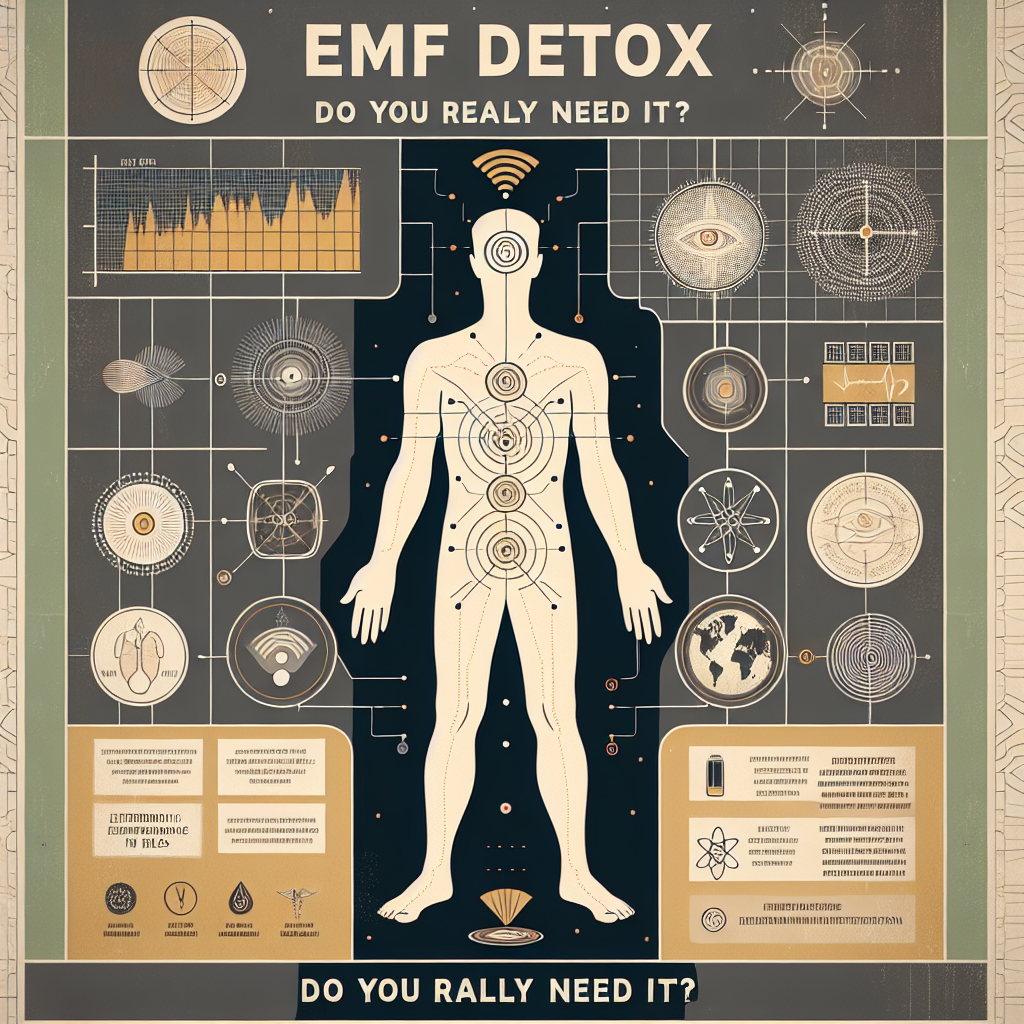EMF Detox: Do You Really Need It?

Discover the truth about EMF Detox and whether you really need it. Learn more about its benefits and potential impacts on your health. Don’t wait, educate yourself now! Click here to get started.
Understanding the Importance of EMF Detox: Is It Necessary?
Electromagnetic fields, commonly referred to as EMFs, are invisible areas of energy that are associated with the use of electrical power and various forms of natural and man-made lighting. In our modern world, we are constantly surrounded by EMFs, from our smartphones and laptops to Wi-Fi networks and household appliances. While the impact of EMFs on human health is still a topic of ongoing research, some studies suggest that prolonged or excessive exposure may lead to a range of health issues, including sleep disturbances, headaches, and even certain types of cancer. This has led to the emergence of a concept known as EMF detox, which involves reducing exposure to EMFs and mitigating their potential effects on the body. But is EMF detox really necessary?
To answer this question, it’s important to first understand what EMFs are and how they interact with our bodies. EMFs are produced by both natural and man-made sources. The earth’s magnetic field, for instance, is a natural source of EMFs, while man-made sources include power lines, electrical appliances, and wireless devices. When we use these devices or are in close proximity to them, our bodies absorb some of this energy. Some scientists believe that this absorption can cause biological changes that may lead to health problems over time.
The idea behind EMF detox is to minimize these potential risks by reducing exposure to EMFs and taking steps to support the body’s natural detoxification processes. This can involve a range of strategies, from limiting the use of electronic devices and using EMF-shielding products, to eating a healthy diet and getting regular exercise. The goal is not only to reduce the amount of EMF energy that the body absorbs, but also to strengthen the body’s ability to repair any potential damage that may occur.
However, it’s important to note that the science on EMFs and their impact on health is still evolving. While some studies have suggested a link between EMF exposure and health problems, others have found no clear evidence of harm. As such, the necessity of EMF detox is a matter of personal choice and depends largely on one’s individual risk factors and health concerns.
For those who are concerned about EMFs and wish to take proactive steps to reduce their exposure, an EMF detox can be a sensible approach. It’s a way of taking control of one’s health and making conscious choices about the technologies and devices we use every day. At the same time, it’s also important to maintain a balanced perspective and not to become overly anxious about EMFs. After all, they are a part of our modern world and completely avoiding them is virtually impossible.
In conclusion, whether or not you need an EMF detox depends on your personal beliefs, health concerns, and lifestyle. If you are worried about the potential effects of EMFs on your health, it may be worth considering. However, it’s also important to remember that maintaining a healthy lifestyle, including a balanced diet, regular exercise, and good sleep habits, is the most effective way to support your body’s natural detoxification processes and overall health. As with any health-related decision, it’s always a good idea to consult with a healthcare professional before embarking on an EMF detox or any other major lifestyle change.
Exploring the Science Behind EMF Detox: A Critical Need or a Health Fad?

Electromagnetic fields (EMFs) are invisible areas of energy, often referred to as radiation, that are associated with the use of electrical power and various forms of natural and man-made lighting. In our modern world, we are constantly surrounded by EMFs, from our smartphones and laptops to our Wi-Fi routers and microwaves. This constant exposure has led to a growing concern about the potential health effects of EMFs, giving rise to the concept of EMF detox.
EMF detox is a term used to describe various methods and practices aimed at reducing exposure to EMFs and mitigating their potential harmful effects. These methods can range from simple lifestyle changes, such as reducing screen time and using wired headphones instead of Bluetooth, to more complex solutions like using EMF shielding devices and detox supplements. But is EMF detox really necessary? Or is it just another health fad?
To answer this question, we need to delve into the science behind EMFs and their potential impact on our health. The World Health Organization (WHO) classifies EMFs as possibly carcinogenic to humans, based on an increased risk for glioma, a malignant type of brain cancer, associated with wireless phone use. However, it’s important to note that this classification is based on limited evidence and further research is needed to establish a definitive link between EMF exposure and cancer.
Moreover, the majority of studies conducted on EMF exposure have focused on high-frequency EMFs, such as those emitted by X-rays and ultraviolet rays, which have been proven to be harmful. However, the EMFs we encounter on a daily basis, such as those from our phones and Wi-Fi routers, are low-frequency EMFs. The health effects of low-frequency EMFs are still not fully understood, and the scientific community remains divided on this issue.
On one hand, some studies suggest that long-term exposure to low-frequency EMFs could lead to health issues such as insomnia, depression, and even certain types of cancer. On the other hand, many experts argue that these studies are inconclusive and that the level of EMF exposure from everyday devices is too low to cause significant health risks.
In light of this scientific uncertainty, the concept of EMF detox has gained popularity. However, it’s important to approach this trend with a critical eye. While reducing screen time and using wired headphones can certainly have other health benefits, such as improving sleep quality and preventing hearing loss, the effectiveness of more complex EMF detox methods, like EMF shielding devices and detox supplements, is still up for debate.
Furthermore, it’s worth noting that our bodies are naturally equipped to deal with a certain level of environmental stressors, including EMFs. Our cells have repair mechanisms that can fix any damage caused by low-level radiation. Therefore, unless you’re exposed to high levels of EMFs, your body should be able to handle the exposure without needing a detox.
In conclusion, while the potential health effects of EMFs are a valid concern, the concept of EMF detox may not be as necessary as it’s made out to be. It’s always a good idea to limit unnecessary exposure to potential environmental hazards, but it’s also important to remember that our bodies are more resilient than we often give them credit for. As with any health trend, it’s crucial to stay informed and make decisions based on solid scientific evidence, rather than fear or speculation.
The Pros and Cons of EMF Detox: Evaluating its Necessity for Optimal Health
Electromagnetic fields (EMFs) are invisible areas of energy, often referred to as radiation, associated with the use of electrical power and various forms of natural and man-made lighting. In our modern world, exposure to EMFs is almost unavoidable. From our smartphones to our microwaves, EMFs are everywhere. This has led to a growing concern about the potential health effects of prolonged exposure to these fields, and consequently, the concept of EMF detox has gained traction. But is it really necessary for optimal health? Let’s delve into the pros and cons of EMF detox to evaluate its necessity.
On the positive side, proponents of EMF detox argue that reducing exposure to EMFs can lead to improved health outcomes. They believe that EMFs can cause a variety of health issues, including headaches, fatigue, sleep disturbances, and even more serious conditions like cancer. By limiting exposure to these fields, they argue, individuals can reduce their risk of these health problems. This is often achieved through a combination of lifestyle changes, such as reducing the use of electronic devices, and the use of EMF-blocking products, like special clothing or paint.
Moreover, some people report feeling better after implementing an EMF detox. They claim to experience less fatigue, better sleep, and improved overall well-being. These anecdotal reports provide some support for the idea that reducing EMF exposure can have tangible health benefits.
However, it’s important to consider the other side of the coin. Many experts argue that the fear surrounding EMFs is largely unfounded. They point out that while high levels of EMFs can be harmful, the levels most people are exposed to in their daily lives are far below those that can cause health problems. They also note that the evidence linking low-level EMF exposure to health issues is weak and inconsistent.
Furthermore, the World Health Organization (WHO) states that current evidence does not confirm the existence of any health consequences from exposure to low-level electromagnetic fields. This suggests that for most people, an EMF detox may not be necessary for optimal health.
In addition, some critics argue that the focus on EMF detox can distract from more established health risks. For example, the time and energy spent worrying about EMFs could be better spent on proven health-promoting activities, like eating a balanced diet, getting regular exercise, and avoiding smoking.
Lastly, it’s worth noting that many EMF-blocking products have not been scientifically proven to be effective. This means that people who invest in these products may not be getting the protection they believe they are.
In conclusion, the necessity of an EMF detox for optimal health is a matter of debate. While some people believe that reducing EMF exposure can lead to improved health, others argue that the risks associated with EMFs are overstated and that the focus should be on more established health risks. As with many health-related issues, it’s important to do your own research and consult with a healthcare professional before making any major changes to your lifestyle or health routine.